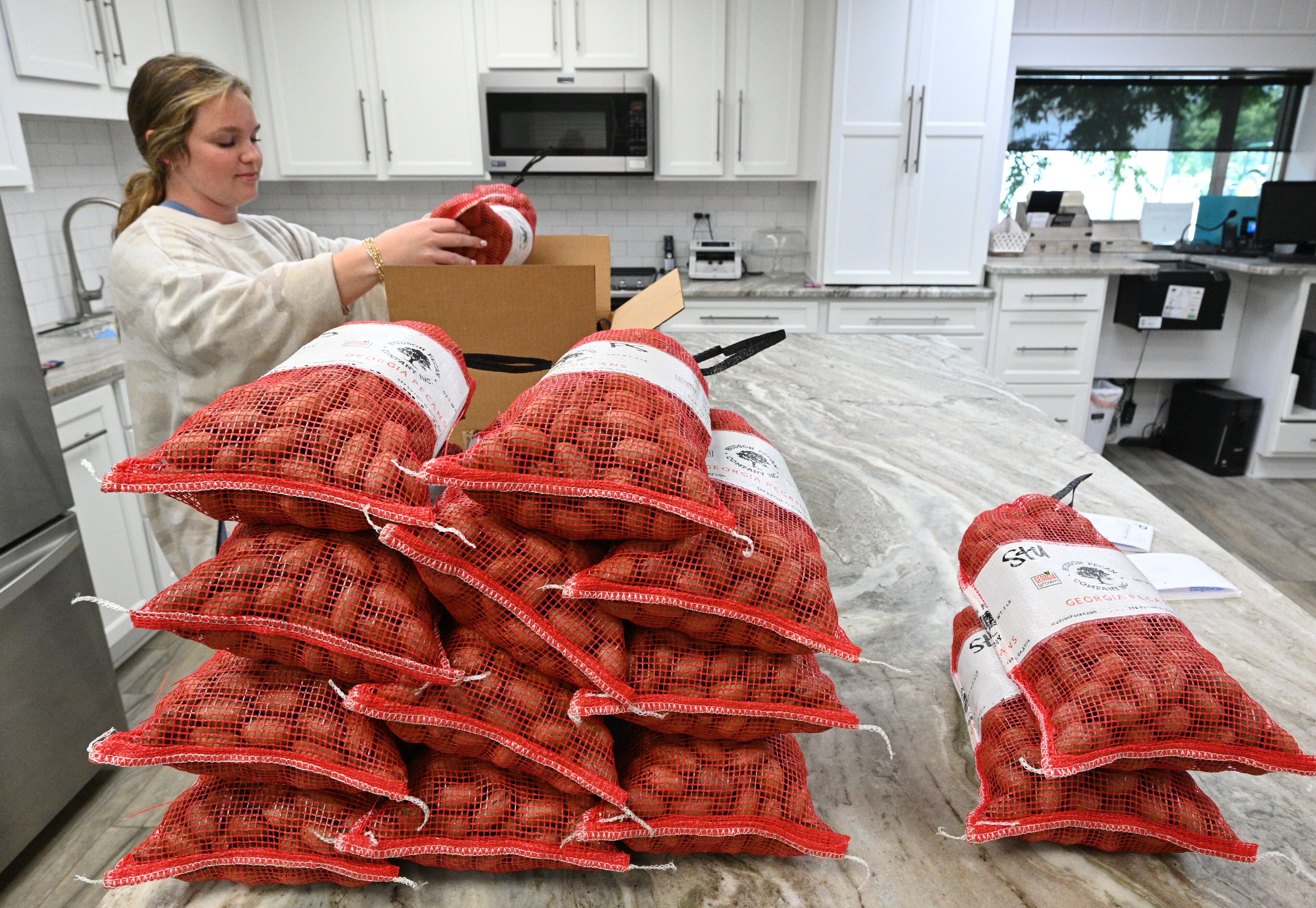Georgia pecan growers rebound from tariffs, a pandemic and hurricanes

South Georgia pecan farmer Scott Hudson returned recently from Shanghai after one of the world’s largest trade shows. It was his first trip to China since the COVID-19 pandemic hit more than three years ago.
Hudson is president and CFO of Hudson Pecan Company in Ocilla, more than 180 miles southeast of Atlanta. The company has about 2,300 acres of pecan trees, and China is one of its biggest buyers. Before the pandemic, Hudson would visit the country two-to-three times a year, he said.
Hudson’s return to China in May is cause for optimism amid a U.S. trade war with China that has hammered Georgia pecan farmers. Tariffs from China are creeping down as of late, and Hudson relished the opportunity to meet again with his customers face-to-face.
“It’s a great opportunity to network, meet other potential buyers,” Hudson said. “But in this instance it was just great for us, American ag, to be back in the nation.”
These signs of optimism are percolating industry-wide in Georgia. India dropped its tariffs 70% this year, and pecan sellers are looking to enter the Indian market in a bigger way. Farmers also report signs of recovery from Hurricane Michael’s destruction that wiped out entire orchards around the state.

After consecutive years of challenges stemming from COVID-19, tariffs, and the hurricane, pecan cultivators across Georgia have shown resilience. The resilience of these farmers is crucial for Georgia’s agriculture industry.
Georgia’s pecan production was valued at $212.6 million in 2022, according to the most recent U.S. Department of Agriculture data. Pecan production sits behind only peanuts, cotton, and corn statewide.
That makes Georgia the largest pecan supplier in the U.S., accounting for one-third of all domestic production, according to the University of Georgia Cooperative Extension. The extension service provides research and assistance to farmers across the state.
India’s recent tariff reduction presents an opportunity for growth. In 2022, the U.S. exported around 109 metric tons of pecans to India, according to a report from the USDA. Each metric ton of the tree nut weighs about as much as two adult beef cattle.
The dollar value of those exports is relatively small, amounting to an estimated $1.3 million. The same USDA report notes a report from India that pecan export growth will reach $2 million to $5 million annually in the new market. As India has eclipsed China as the world’s most-populous nation, that figure could continue to grow.
“It just really hit home when [India] dropped it back down to 30%,” said Samantha McLeod, executive director of the Georgia Pecan Grower’s Association. “That 70% reduction was huge for us.”
The trade war with China showed Georgia’s industry that it should not rely too heavily on one market for exports, McLeod said. Around three-fifths of Georgia’s pecan exports went to China before the tariffs were hiked in 2018. That’s why many in the industry are looking towards the market in India.
Will Easterlin is a pecan handler in Montezuma, southwest of Macon, buying and selling pecans across the globe. Easterlin recently was named chairman of the American Pecan Council’s International Committee. One function of the group is to develop overseas marketing.
Since Easterlin took over, India has been a target, and the group intends to ramp up marketing there.
Diplomacy also plays a crucial role in the global pecan market. The Georgia Pecan Growers Association has worked with both state and federal officials to reduce tariffs. The efforts to boost Georgia pecans go across party lines too, with growers acknowledging efforts from various elected officials.
“I am very thankful for the representation we have in Washington,” Hudson said.

Much of the trade war with China coincided with pandemic lockdowns, and recent improvements could be seen as modest.
Some growers, such as Matthew Bailey of Global Commodities Exchange in Camilla, see their exports to China increasing. But the tariff hasn’t returned to pre-trade war levels.
In other words, U.S. pecan sellers are still at a disadvantage compared to other countries such as Mexico or South Africa. While farmers and sellers across the state are looking towards a better 2023 and 2024, there’s room for improvement.
“I can certainly say for American pecans, the lack of being able to touch that market the way we used to touch it is really dealing a crucial blow to the pricing of our product,” Hudson said.
International travel and trade are not the only setbacks. Hurricane Michael put some farmers out of business, eliminating entire orchards. But the impact was uneven, with farms towards Middle and Southeast Georgia not hit as badly as those around Albany.
For growers that made it through the natural disaster, many have changed operations to protect their orchards. Bailey, the grower from Camilla, in Southwest Georgia, implemented a hedging program. Hedging prunes the large pecan trees to a smaller size, and the lower surface area across the orchards make trees more resilient in strong winds.
Hudson, of Ocilla, lost only blocks of trees. Hudson’s long-term improvement comes in the form of new varieties that require fewer resources.
Most days, Hudson tends to the trees. Even after a rainy two weeks in June, the production continues, despite a tough spring harvest and the rough past few years. Farmers are known as the eternal optimists. Although the outlook may not be perfect, they take note of signs for growth to come.
“Primarily, I’m just a Georgia pecan farmer looking to do better, how about that,” Hudson said.



